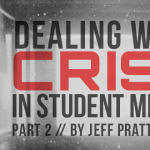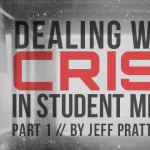The following post was written by Katie Wylie, student ministry marketing strategist
Abuse, neglect, drugs, alcohol, eating disorders, bullying. These are situations our students (and others) are faced with, and we want to help.
Ministering to someone who is walking through a personal crisis can be a difficult road to navigate. Emotions often run high and crisis situations can take a toll on our judgement, especially when they involve someone we care about deeply. Here are four things to remember when you minister through a crisis situation.
Set boundaries. (Galatians 6:1-2)
Galatians tells us that if someone is caught up in sin, we should restore them with a gentle spirit, making sure we won’t also be tempted. “Carry one another’s burdens; in this way you will fulfill the law of Christ.”
Crisis situations can become all-encompassing. It can be tempting to put everything in your life on hold to help someone through a crisis– this is why boundaries are important. Dropping everything (or any amount of money) to help someone in a time of need may seem sacrificial, but it is not always best for the person you’re trying to help, or for your family. Ask God to reveal specific ways you can help.
Provide truth, not opinions. (2 Timothy 3:16-17)
Often, someone in crisis needs a listening ear. While it can be tempting to offer your opinion or advice, make sure you’re pointing that person to the truths of Scripture and the character of God. Words of advice may be comforting, but the Words of the Lord are transforming.
Pray constantly, believing that God has the power to heal brokenness. (Matthew 21:18-22)
When someone you love is in the middle of a crisis, it’s really easy for them to lose sight of who God is and just how powerful He is. Keep praying and interceding on their behalf. The God who spoke everything into existence is in control of this situation, too. Set an alarm on your phone as a reminder to pray specifically for the situation during certain times of the day.
Be willing to make a difficult decision. (Proverbs 2:6)
Ask God for discernment in the situation. If someone’s well-being or safety is in jeopardy and they are not under the proper care, be willing to make a phone call. Whether it’s to a parent, pastor, counselor, or 911, there are some situations that warrant more help than we can provide on our own. While a phone call may initially damage your relationship with the person in crisis, the help they’ll receive from it will far outweigh the temporary pain it will cause.



